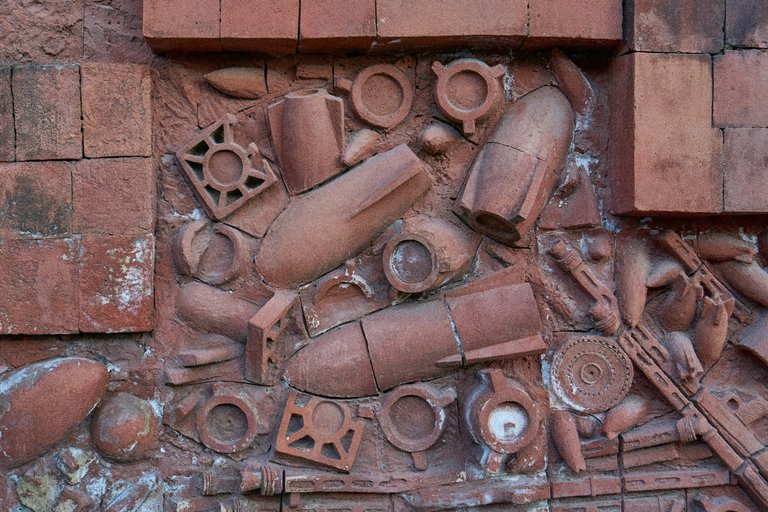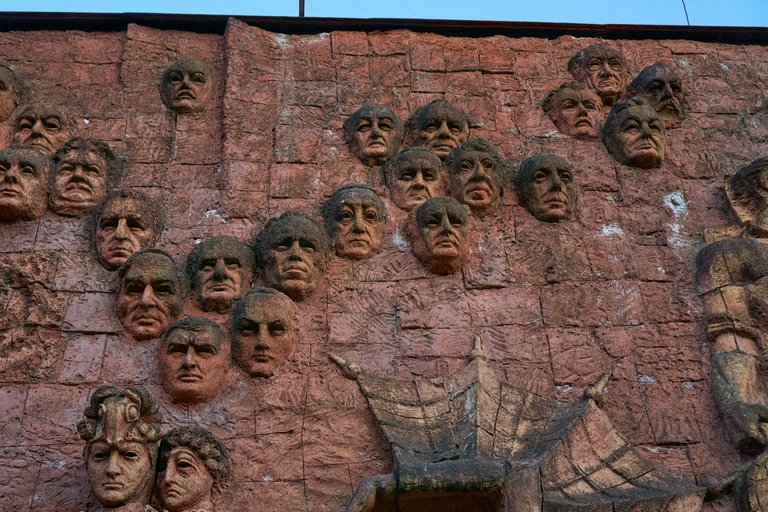The Death of a Market in Kutaisi, Georgia

The market is a dying concept. Particularly in many western nations. Though here in the former Soviet republics, markets are a thing that many have relied on for the past thirty years as the communist ideology abruptly came to an end and money very quickly became a necessity. Through the collapse of industry and the reliance on government backing, communities grew strong with the creation of many markets. Locals would flock to them with their local produce, whether it's dairy products or fresh fruit and vegetables. Though as the years went by, the markets found less and less interest. That aspect of community dwindled with more competitive pricing and the pursuit of convenience. Where electronic doors opened and closed to higher foot traffic just across the street. This has led to the collapse of many markets throughout the region, and it really shows.

This market in Kutaisi, Georgia was one of many that I have seen that hang on by a thread. Their remaining sellers an aged population. Old women wrapped up in many layers of clothing and little blankets to protect themselves from the colder days and the more open environment. They'll sit there for an entire day waiting for someone to come by and potentially buy something from them. Other stalls are empty, covered up and rarely visited, more of a side thing that they maintain as they seek work elsewhere. Younger generations still farming, but finding other ways to make money through construction works in the area instead of the reliance on their farm output. To walk through a market is to walk around damp tents or halls with metallic rooftops, the smell is of cold stone and maybe some of the smell of fresh greens like dill. Muddy potatoes and very likely a strong stench of cheese.
These markets have dwindled with the introduction of globalism and more corporate interests in these areas, as bigger chains appear that the newer generations go to, but there's also no denying that the former communities that relied on these markets disappeared as a result of being victims of time themselves. The older populations simply dying off. Aged to the point of being incapable of walking off to the local market, reduced to staying at home, having others do their shopping for them. Again, that younger generation that'll run off to the nearest supermarket chain to grab a few things.

Walking through the market, I could feel the sadness. Signs of life remained with how the men would pass the time playing Nardi together. The sound of dice rolling across the board piercing through the silence of the halls. That slapping of each piece being moved as the players made their moves. This is a common sight throughout various forms of markets, not just the ones that sell food. Often enough it's accompanied by the warmth of some vodka, though in many other cases the smell of little disposable coffee cups and some strong instant coffee that's likely burnt. For the space that all of this takes place within, I couldn't help but think that this location lived on borrowed time. Throughout Georgia, in the more dense cities, it has grown a common coincidence that similar markets have gone up in flames. Overnight. Always an unknown result. Leading to a total destruction of many of these old seller's inventory. At the same time, local governments previously having expressed interest in developing the areas.
I knew, walking around, that I was witnessing the slow death of a market. The death of an era as the reliance and community withered away. Even for these remaining sellers, sooner or later they too will grow too old and weak to continue doing this. To keep appearing every day with their produce that barely sells.

A more depressing feature of the market is a Soviet era (1985) relief that displays many Georgian cultural events and people. This sits at the very entrance of the market and covers the entire side of a building in the centre of Kutaisi. I say it's depressing, but you'll feel that impact of its images when looking deeper into its features. Many faces appear on the side of it, which detail the regular people of Kutaisi, the many faces that came and went throughout the generations. It includes people of history, but also cultural depictions within mythology. At the very bottom of the relief, it displays various aspects of war. Ultimately symbolising the roots of the region, the hardships faced from the Second World War as well as other conflicts. But also how the people have risen up above such hardships and flourished. With the growth of families. The growth of trees that yield fruit. The might of the communist worker that builds and pushes forward with their community. And also the symbols of Christianity which remains strong in the region.




The entire relief was too wide and tall to capture in its entirety with the camera I had. My focal length being 35mm on an APS-C sensor. I think that also shows the scale of it all. And that is where some of that sadness comes into play. It's a beautiful relief that shows the hardships faced and how the people overcame them, and how growth came from culture and community. But the moment you step into those doors, you realise the decay of it all. That symbolism no longer relatable. The hardships are back, the community dwindles. The times are changing rapidly for the people of the market, even for the locals of Kutaisi that never attend it. Some can't adapt. Some are too familiar with the old ways. Having already been exposed to incredibly difficult times and societal changes. For others, it's a little too late to even try to adapt.
Soon those halls will grow more cold, more damp, and more silent. No longer filled with the sounds of Nardi. The smell of coffee no longer present. The various produce and packaging left to rot and collect dust. Blankets over stalls that darken with mould. And after, the bulldozers will come to make way for a new high-rise. And no relief will depict this era of hardships. No relief will display what one was.
You can check out this post and your own profile on the map. Be part of the Worldmappin Community and join our Discord Channel to get in touch with other travelers, ask questions or just be updated on our latest features.
Congratulations, your post has been added to the TravelFeed Map! 🎉🥳🌴
Did you know you have your own profile map?
And every post has their own map too!
Want to have your post on the map too?
- Go to TravelFeed Map
- Click the create pin button
- Drag the marker to where your post should be. Zoom in if needed or use the search bar (top right).
- Copy and paste the generated code in your post (any Hive frontend)
- Or login with Hive Keychain or Hivesigner and click "create post" to post to Hive directly from TravelFeed
- Congrats, your post is now on the map!
PS: You can import your previous Pinmapple posts to the TravelFeed map.Opt Out
A very extraordinary experience, the market place is very nice, and has a very interesting atmosphere ❤️🙏
Thanks for being the only person to take note of it all :^)
You're welcome my friend ❤️🙏
I think that the current type of market is dying off but is also being replaced by more youthful and global options.
Since covid there has been a huge resurgence over here of small homemade businesses as people turn away from the global stores and try to earn from their own products again.
It's done in more modern ways with mobile stalls and online sites but i can see that a lot of people still appreciate the stall and the idea of supporting independent producers and sellers.
Maybe markets are not dead but just evolving.
Your reply is upvoted by @topcomment; a manual curation service that rewards meaningful and engaging comments.
More Info - Support us! - Reports - Discord Channel
That's actually really nice to hear. These markets would've flourished even a few years ago but many of these areas are starting to modernise in many ways, from new development/tourist treatment, to the appearance of much larger chain supermarkets. Kutaisi is an incredibly small town with multiple markets, some are doing okay, others you can tell are on their last breaths.
I saw one entire market area there that was just completely empty. But you could tell it was once a market because it was just a huge space full of empty stalls by the road. All the stalls now weathered and falling apart.
That's definitely way too advanced for here! I've sort of forgotten how things are back home after being away for so long. In some ways I think Georgia/Armenia are about 20 years behind with the digital age. Maybe eventually they'll catch up.
Congratulations @namiks! You received the biggest smile and some love from TravelFeed! Keep up the amazing blog. 😍 Your post was also chosen as top pick of the day and is now featured on the TravelFeed front page.
Thanks for using TravelFeed!
@for91days (TravelFeed team)
PS: You can now read your favourite travel blogs on your phone. Plus, blogging on-the-go just got easier! Download our app on the Apple App Store or get it on Google Play.
Some people still prefer to shop in those markets rather than in the big supermarkets where everything feels plastic and unnatural... I guess it happens with markets like with books...
Maybe this market will disappear but local producers will always find an alternative way to sell their goods. On a smaller scale of course... I would be one of those who would buy here. And what's more, I like it better this way. A crowded market with wet aisle and so many pungent smells hahaha... I don't know. I'm not a big fan of crowds.
Very nice post! ;)
Beautiful photos and a powerful story. I have seen these types of markets alive and well in much of the developing world, but hardly ever anything of this scale in any western countries. These markets are always the beating heart of the community, bringing people together, and a reliable source for fresh local foods. When communities lose this kind of place, or when one dies a slow death as is the case here, it is truly heartbreaking. I hope this community find a way to breath fresh life into this place, so that is does not become just another abandoned shadow of the past.
Your reply is upvoted by @topcomment; a manual curation service that rewards meaningful and engaging comments.
More Info - Support us! - Reports - Discord Channel